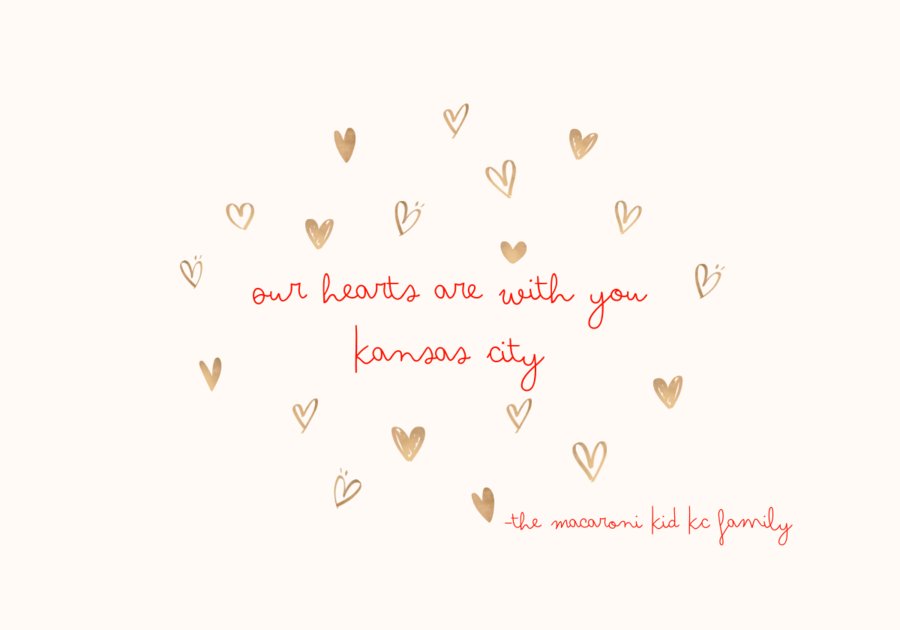On a day that was meant to be filled with romance, love, and happiness, along with great pride and celebration for the Kansas City Chiefs, we met an unfortunate situation. Events like these are unpredictable; celebrating with our kingdom to running for our lives is never something that anyone could have ever seen coming. While this is something that we will feel as a community for an unknown amount of time, it is not the end all for our community. We are Kansas City Strong.
In the face of adversity, we will come together to support those that are affected, some in more ways than one. It is important that we look out for one another in the days to come. Situations such as this, a crisis, a trauma, can have “side effects” that will show themselves differently for every individual. With that, it is important that we have the resources that we need in order to recover from such events. We may not see the potential side effects of today's events for quite some time, sometimes it doesn’t show itself right away. - Rhiannon Bowles
What we need to know about trauma:
Trauma is best defined as an experience in which an individual feels that the safety or wellbeing of themselves, someone they love, or someone around them is in danger. Trauma is a perspective subject. While there were hundreds of thousands of individuals in attendance for this event- each of those individuals will have their own unique reaction. Trauma is not a “one size fits all” type of situation.
There are two main types of trauma exposures that may be seen from this event: direct and indirect (secondary) trauma. Every individual that was present experienced the same direct trauma, but perceived it differently than the person next to them. Each experience, while collective, was unique. This will cause a vast array of trauma responses in the upcoming months. The person you were standing next to during this tragic event may have a completely different reaction than you (and that is okay!). Secondary trauma can be seen for the other side of our community. These individuals would include those who left the event before the trauma occurred, those who did not attend but are a member of the community, and even those who are family members of someone who was in attendance during the event.
What about the kiddos?
For those of you with little kiddos, or even adolescents, that were in attendance during this event, please be on the lookout for behavior that is abnormal to your child’s typical behavior. Little ones that saw the events of today may not understand what has happened, but their bodies will keep hold of what happened. They may not be able to verbalize what they are feeling or experiencing, but it may be shown through their behavior.
You may be asking, “what should I be on the lookout for?” Remember that nobody knows your child better than you do. You know what is and is not typical behavior of your child(ren). These abnormalities could be seen as an uptick in anger, nightmares, irritability, screaming, “jumpiness” around loud noises, or even bedwetting. Trauma responses in our especially little ones (early childhood) may also reenact some of what they saw through imaginative play or draw it out through their artwork. Other behaviors to be on the look out for is increased isolation (spending more time than usual in their room or engaging in individual play), withdrawal, and appetite changes not related to another underlying issue such as illness. Many of these reactions, such as anger, irritability, and isolation/withdrawal, also apply to our older kiddos in middle childhood and adolescence. Our teens may also spend less time with their friends as a form of withdrawal or begin to skip school. For any school aged kids, we may also see a decline or regression in academic achievement.
What can I do to help my kiddos?
The most important part in helping our kid(s) through a traumatic event is simply just to be there for them. Allowing yourself to be available physically, spiritually, and emotionally for your children when they are experiencing big feelings can be highly beneficial. Many children do not feel as if they have any control in their everyday lives and sometimes kiddos may feel invalidated with everyday feelings. If your kiddo is having a rough night and wants to climb into bed with you, let them. They are safe with you. You are their comfort. Do daily check-ins other than “how are you feeling?” or “how was your day”. Instead, prompt questions that aren’t as unstructured and open ended such as “what was your favorite part about today?”, “What did you do that made you proud of yourself today?”.
Our children are like sponges- the younger they are, the more they absorb from the fountain of life we provide them. The way that we react, the way that we behave and speak, they retain it all. Don’t get angry with your kids for having these big emotions. If you are having your own run in with big emotions, find something you can do together to distract one another with your presence. Encourage your children to stay involved in their activities. Continue to ask about their school work and what they are learning. If you kids have questions, do your best to answer them. Odds are they will hear about it somewhere else (like school) anyways, and it may be easier to digest coming from a parent.
If you have concerns about your child’s wellbeing, schedule a meeting with the school counselor to do a check in and even ask their teacher(s) how they are performing in class. There may also be times when therapy is beneficial and necessary for our kiddos. There is nothing wrong with getting the help we need. It is important to note that if we, as parents, are having our own big emotions and adverse reactions, we also need to listen to OUR bodies. We have needs as well, and if we do not fulfill our needs, how can we fulfill the needs of our kids? Our children are what we teach them, let’s teach them mental wellbeing, security, safety, love, and compassion.
What comes next?
These next few days, weeks, months, or sometimes even years, will be filled with many different emotions. Experiences of guilt, such as survivors' guilt, may be seen. It is also possible to see reactions, both physiological and psychological, when driving past the parade route or Union Station. Being near the scene of a traumatic event may cause increased heart rate, sweating, shaking, rapid breathing, or other physiological symptoms. Some individuals may not feel as if they can return to the area in which the events occurred for a period of time due to these feelings. Breathing and grounding exercises can be beneficial to mediating these reactions.
Some individuals may have intrusive thoughts of the dreaded “what if?”, or “why me?”, regarding the event and experiencing intense anger or depressive symptoms. Sometimes individuals may wonder what could have happened and dwell on those “what if” scenarios. With summer quickly approaching, it is also important to know that for some individuals, the 4th of July may be difficult this year. The sound of fireworks blasting may bring up some unsettling reminders of this event. If you are experiencing hypersensitivity towards loud noises, please plan for this day accordingly by being in the presence of an individual you feel safe with. It is important to have a safety plan in place for those experiencing distressing reactions to adverse events.
It is never “too late” to receive care for anything that may be troubling our minds. Therapy is not a sign of weakness, it is not an ailment or an admission of defeat. Therapy is empowering, it is a tool to become our best selves, it is hard work, it is admirable. It is important to remember that therapy, just like trauma, is not “one size fits all”. It may take a few different professionals for you to find the right treatment plan for you and the right professional for you (and that’s okay!).
Still not sure what to do or what to say to your child(ren) about the events that unfolded after the Chiefs rally? Use these tools on how to have open conversations with children about such tragedies, and check out this article with lots of local resources to help support those dealing with trauma.
Understanding, empathy, and unity during challenging times is crucial. Your commitment in offering support and solace showcases the significant influence we can collectively have on one another in moments of grief.
This article was written in collaboration with Rhiannon Bowles, a local KS resident and Masters of Clinical Mental and Behavioral Health Counseling student at Culver-Stockton College in Missouri.










